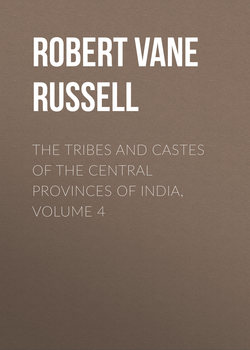Читать книгу The Tribes and Castes of the Central Provinces of India, Volume 4 - Robert Vane Russell - Страница 52
Part II
Articles on Castes and Tribes
Kumhār—Yemkala
Vol. IV
Kurmi
13. Pregnancy rites
ОглавлениеAs regards pregnancy Mr. Marten writes as follows:62 “A woman in pregnancy is in a state of taboo and is peculiarly liable to the influence of magic and in some respects dangerous to others. She is exempt from the observance of fasts, is allowed any food she fancies, and is fed with sweets and all sorts of rich food, especially in the fifth month. She should not visit her neighbour’s houses nor sleep in any open place. Her clothes are kept separate from others. She is subject to a large number of restrictions in her ordinary life with a view of avoiding everything that might prejudice or retard her delivery. She should eschew all red clothes or red things of any sort, such as suggest blood, till the third or fourth month, when conception is certain. She will be careful not to touch the dress of any woman who has had a miscarriage. She will not cross running water, as it might cause premature delivery, nor go near a she-buffalo or a mare lest delivery be retarded, since a mare is twelve months in foal. If she does by chance approach these animals she must propitiate them by offerings of grain. Nor in some cases will she light a lamp, for fear the flame in some way may hurt the child. She should not finish any sowing, previously begun, during pregnancy, nor should her husband thatch the house or repair his axe. An eclipse is particularly dangerous to the unborn child and she must not leave the house during its continuance, but must sit still with a stone pestle in her lap and anoint her womb with cowdung. Under no circumstances must she touch any cutting instrument as it might cause her child to be born mutilated.
“During the fifth month of pregnancy the family gods are worshipped to avoid generally any difficulties in her labour. Towards the end of that month and sometimes in the seventh month she rubs her body with a preparation of gram-flour, castor-oil and turmeric, bathes herself, and is clothed with new garments and seated on a wooden stool in a space freshly cleaned and spread with cowdung. Her lap is then filled with sweets called pakwān made of cocoanut. A similar ceremony called Boha Jewan is sometimes performed in the seventh or eighth month, when a new sāri is given to her and grain is thrown into her lap. Another special rite is the Pansavan ceremony, performed to remove all defects in the child, give it a male form, increase its size and beauty, give it wisdom and avert the influence of evil spirits.”
62
Central Provinces Census Report (1911), p. 153.
